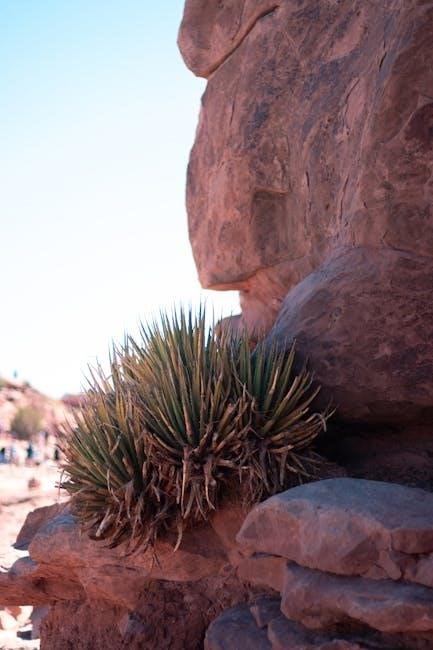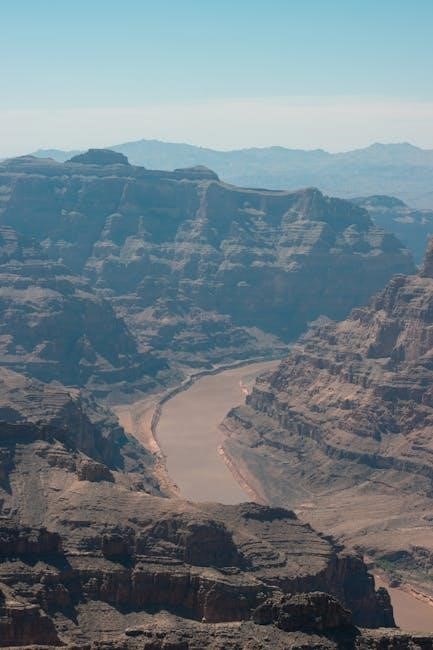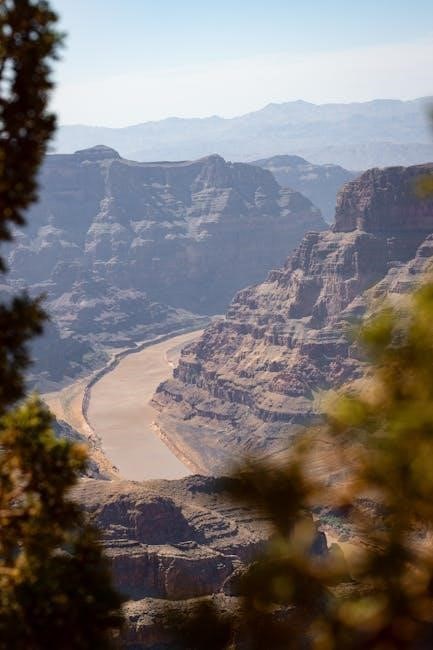An Arizona Last Will and Testament outlines how assets are distributed after death‚ ensuring wishes are respected. It appoints executors‚ protects loved ones‚ and provides peace of mind.
Definition and Purpose
An Arizona Last Will and Testament is a legal document detailing how a person’s assets‚ property‚ and affairs should be managed after their death. Its primary purpose is to ensure the testator’s wishes are carried out‚ appointing an executor to oversee the estate and providing clear instructions for asset distribution. This document offers clarity‚ control‚ and peace of mind‚ safeguarding the testator’s legacy and protecting their loved ones’ interests.
Importance of Having a Last Will and Testament in Arizona
HAVING a Last Will and Testament in Arizona ensures your assets are distributed according to your wishes‚ avoiding intestacy laws. It allows you to appoint an executor‚ name guardians for minors‚ and prevent family disputes. A will provides clarity and control‚ protecting your legacy and loved ones. It is a crucial step for estate planning‚ offering peace of mind and ensuring your desires are legally enforced after your passing.
Legal Requirements for a Valid Will in Arizona
A valid Arizona will requires the testator to be at least 18 years old and of sound mind. It must be in writing‚ signed by the testator‚ and witnessed by two independent individuals. Arizona does not require notarization but adheres to specific statutory guidelines to ensure the will’s legality and enforceability.
Eligibility to Create a Will in Arizona
In Arizona‚ individuals must be at least 18 years old and of sound mind to create a valid will. The testator must have the mental capacity to understand the nature of their actions and decisions. The will must be created without duress or undue influence‚ ensuring the document reflects the testator’s true wishes. Arizona adheres to specific statutory guidelines to establish eligibility and ensure the will’s validity.
Witness and Signature Requirements
An Arizona will must be signed by the testator and two witnesses who are not beneficiaries. Witnesses must attest to the testator’s sound mind and absence of duress. Their signatures confirm the document’s authenticity. The testator’s signature is essential for validity‚ and witnesses must sign in each other’s presence. Notarization is not required but recommended to create a self-proving will‚ simplifying probate. Proper execution ensures the will is legally binding.
Notarization and Other Formalities
Notarization isn’t required in Arizona but is recommended to create a self-proving will. A notary public verifies the testator’s identity and mental capacity‚ simplifying the probate process. This step helps prevent delays and ensures the will’s authenticity. While optional‚ it’s a prudent step for ensuring the document is legally binding and recognized without further verification in court.

Key Components of an Arizona Last Will and Testament
A valid Arizona will includes declarations‚ executor appointments‚ beneficiary designations‚ and asset distribution plans. It ensures clarity and legality in carrying out the testator’s final wishes.
Declaration and Revocation of Prior Wills
The document begins with a declaration‚ stating the testator’s intent to revoke all prior wills and codicils. This ensures clarity and prevents confusion‚ making the current will the sole legal document governing asset distribution. The testator must affirm they are of sound mind and acting voluntarily‚ free from coercion or undue influence. This section is critical to avoid disputes and ensure the testator’s final wishes are honored without ambiguity.
Appointment of Executor
The testator names a trusted executor to manage the estate‚ ensuring assets are distributed according to their wishes. The executor must be at least 18 years old and cannot be a beneficiary to avoid conflicts of interest. This section establishes clear authority‚ ensuring the estate is handled efficiently and responsibly after the testator’s passing. Naming an executor is crucial for maintaining order and fulfilling the testator’s intentions.
Asset Distribution and Beneficiaries
An Arizona Last Will and Testament allows the testator to specify how assets‚ including real‚ personal‚ and digital property‚ are distributed after death. Beneficiaries are named to inherit specific assets or shares of the estate. This section ensures loved ones are provided for according to the testator’s wishes‚ with clear instructions to prevent disputes. It also enables the testator to leave special bequests or gifts to chosen individuals or organizations.
Special Bequests and Gifts
A special bequest in an Arizona Last Will and Testament allows the testator to leave specific gifts‚ such as personal items‚ money‚ or property‚ to designated individuals or charities. These bequests are typically detailed to reflect the testator’s personal wishes and values. This section ensures that meaningful assets are distributed according to the testator’s intent‚ providing a lasting legacy and fulfilling their desires beyond general estate distribution.
Residual Estate and Contingent Beneficiaries
The residual estate refers to the remaining assets after specific bequests are distributed. It is allocated to designated beneficiaries‚ ensuring no property is left unaddressed. Contingent beneficiaries are named to inherit if the primary beneficiary predeceases the testator or is unable to accept the inheritance. This section ensures a smooth transfer of remaining assets according to the testator’s wishes‚ avoiding intestacy and providing clarity for unforeseen circumstances.

Creating an Arizona Last Will and Testament
Creating an Arizona Last Will and Testament involves outlining asset distribution‚ appointing an executor‚ and ensuring legal compliance. DIY templates or attorneys can facilitate the process‚ providing clarity and peace of mind for testators and their loved ones.
DIY Will Templates vs. Hiring an Attorney
DIY will templates offer a cost-effective solution for simple estates‚ providing pre-drafted forms that can be completed independently. However‚ for complex situations or significant assets‚ hiring an attorney ensures legal accuracy and personalized guidance. While templates are convenient‚ they may lack the tailored advice an attorney provides‚ potentially leading to oversights. Choosing between the two depends on individual circumstances and the desired level of professional involvement.
Steps to Draft a Will
To draft a will‚ start by declaring the document as your Last Will and Testament and revoke prior versions. Appoint an executor to manage your estate. List all assets‚ including property and personal items. Designate beneficiaries for each asset or category. Address debts‚ taxes‚ and funeral expenses. Include special bequests or gifts. Finally‚ sign the document in the presence of two witnesses‚ ensuring compliance with Arizona state laws.
Common Mistakes to Avoid
When drafting a will‚ avoid mistakes like improper signing without witnesses or notarization‚ which can lead to invalidation. Ensure all assets are accounted for and beneficiaries are clearly named. Avoid using outdated templates without legal advice‚ as Arizona-specific laws may not be addressed. Do not neglect to update the will after major life changes‚ such as divorce or new heirs. These oversights can cause legal disputes and undermine your wishes.

Updating and Revoking a Will
A will requires updates after life changes like births‚ deaths‚ marriages‚ or asset acquisitions. Revocation involves destroying the document or creating a new one to invalidate it.
When to Update Your Will
Updating your will is essential after significant life events such as births‚ deaths‚ marriages‚ or divorces. It is also necessary when acquiring new assets or experiencing changes in financial status. Additionally‚ if beneficiaries or executors named in the will pass away or are no longer suitable‚ revisions are required. Regular reviews‚ ideally every 5-10 years or after major life changes‚ ensure your wishes remain accurately reflected in the document.
How to Revoke a Will
In Arizona‚ revoking a will requires executing a new will or codicil that explicitly revokes the prior document. The new will must be signed and witnessed according to state law. Destroying the original will with the intent to revoke it can also be effective‚ though creating a new document is more reliable. Legal advice is recommended to ensure proper revocation and avoid potential disputes.

Arizona Last Will and Testament PDF Templates
Free Arizona Last Will and Testament PDF templates are available for download‚ offering a printable and fillable document to plan asset distribution and executor appointments.
Where to Find Free Templates
Free Arizona Last Will and Testament PDF templates can be downloaded from legal websites‚ estate planning platforms‚ or state-specific resources. Many sites offer printable and fillable documents‚ ensuring compliance with Arizona state laws. Online platforms provide easy access to templates tailored for Arizona residents‚ allowing individuals to create a will efficiently and securely. These resources often include instructions for proper execution and witnesses.
How to Fill Out a PDF Template
To fill out an Arizona Last Will and Testament PDF‚ download the template from a reputable source. Use a PDF editor to complete sections for personal details‚ beneficiaries‚ executors‚ and asset distribution. Follow the instructions provided‚ ensuring all fields are filled accurately. Print the document‚ sign it in the presence of two witnesses‚ and consider notarization for added validity. Store the completed will securely to ensure compliance with Arizona state laws.
Execution and Storage of the Will
A signed Arizona Last Will and Testament must be witnessed by two individuals. Store the original in a safe location‚ such as a fireproof safe or with an attorney‚ ensuring it is accessible. Avoid keeping the will in a safe deposit box unless accessible to the executor. Proper storage ensures legal compliance and avoids disputes.
Proper Execution Procedures
A valid Arizona Last Will and Testament must be signed by the testator and two witnesses. The witnesses must acknowledge the document in writing‚ confirming the testator’s sound mind and lack of coercion. Notarization is optional but recommended for a self-proving affidavit‚ streamlining probate. Ensure the will is stored securely‚ such as in a fireproof safe or with an attorney‚ to prevent loss or tampering. Proper execution avoids disputes and ensures legal validity.
Safe Storage Options
Store your Arizona Last Will and Testament securely to prevent loss or tampering. Consider a fireproof safe or a safety deposit box at a bank. Digital storage‚ like encrypted cloud services‚ is also an option. Ensure your executor knows the location. Avoid keeping the original in easily accessible or vulnerable places. Proper storage protects your wishes and ensures a smooth probate process for your loved ones.
Contesting a Will in Arizona
Contesting a will in Arizona involves legal challenges to its validity‚ often by family members or beneficiaries. Understanding the process and emotional impact is crucial.
Grounds for Contesting a Will
A will in Arizona can be contested for several reasons‚ including lack of testamentary capacity‚ undue influence‚ fraud‚ duress‚ or forgery. Additionally‚ improper execution or failure to meet legal requirements may invalidate the document. Beneficiaries or heirs can challenge the will if they believe the testator was not of sound mind or coerced into signing. Legal representation is essential to navigate the complexities of will contests and ensure fair resolution;
Legal Process and Time Limits
In Arizona‚ will contests must be filed within a specific timeframe‚ typically four years after the will is admitted to probate. The legal process involves filing a petition in probate court‚ outlining the grounds for contesting the will. The contestant must prove the will is invalid due to lack of capacity‚ undue influence‚ fraud‚ or improper execution. Legal representation is crucial to navigate this complex process and ensure timely resolution before the deadline expires.

Cost of Creating a Will in Arizona
Creating a will in Arizona can range from free using DIY templates to several hundred dollars for attorney-drafted documents‚ depending on complexity and legal representation needs.
DIY Template Costs
DIY will templates in Arizona are cost-effective‚ with many available for free or starting at $10-$30. These templates offer basic structures for simple estates‚ allowing individuals to draft their will independently. Websites provide downloadable PDFs‚ making it easy to create a legally binding document without attorney fees. While more complex cases may require professional assistance‚ DIY templates are a budget-friendly option for straightforward needs.
Attorney Fees
Hiring an attorney to draft an Arizona Last Will and Testament typically costs between $300 and $1‚000‚ depending on complexity. Simple wills may start at $200‚ while complex estates with trusts or additional planning can exceed $1‚500. Attorneys provide personalized guidance‚ ensuring legal compliance and addressing unique circumstances. While DIY templates are cheaper‚ attorney fees are a worthwhile investment for tailored‚ professional estate planning that offers peace of mind and legal security.

Estate Planning Beyond the Will
Estate planning beyond the will includes trusts‚ powers of attorney‚ and advance directives to ensure comprehensive management of assets and healthcare wishes‚ providing added security.
Trusts and Other Estate Planning Tools
Trusts complement a will by offering additional control over asset distribution. Types include revocable and irrevocable trusts‚ which can provide tax benefits and protect assets. Other tools like powers of attorney and advance directives ensure healthcare wishes are honored. These tools enhance estate planning‚ offering flexibility and protection for beneficiaries while maintaining privacy and avoiding probate. They are essential for comprehensive estate management and peace of mind.
Advance Directives and Living Wills
Advance directives and living wills are legal documents that outline healthcare preferences and end-of-life decisions. They ensure medical wishes are honored if incapacitated. A living will specifies desired treatments‚ while a durable power of attorney appoints someone to make decisions. These tools complement a will by addressing personal care and medical choices‚ ensuring autonomy and reducing burden on loved ones. They are essential for comprehensive estate planning in Arizona.
An Arizona Last Will and Testament ensures your wishes are honored‚ protecting your legacy and loved ones. Use a PDF template for a seamless estate planning process.
Final Thoughts on the Importance of a Will
A Last Will and Testament is essential for ensuring your wishes are respected after death. It allows you to control asset distribution‚ appoint executors‚ and protect beneficiaries. Without a will‚ state laws dictate estate division‚ potentially causing disputes. A will ensures clarity‚ peace of mind‚ and safeguards for loved ones‚ including minor children. Drafting one is a responsible step in securing your legacy and family’s future.
Next Steps for Creating Your Arizona Last Will and Testament
To create your Arizona Last Will and Testament‚ start by downloading a PDF template or consulting an attorney. Review the template‚ ensuring it aligns with state laws. Clearly outline your wishes‚ appoint an executor‚ and list beneficiaries. Sign the document with two witnesses and consider notarization. Store the will securely and update it as needed. Taking these steps ensures your wishes are legally binding and your loved ones are protected.